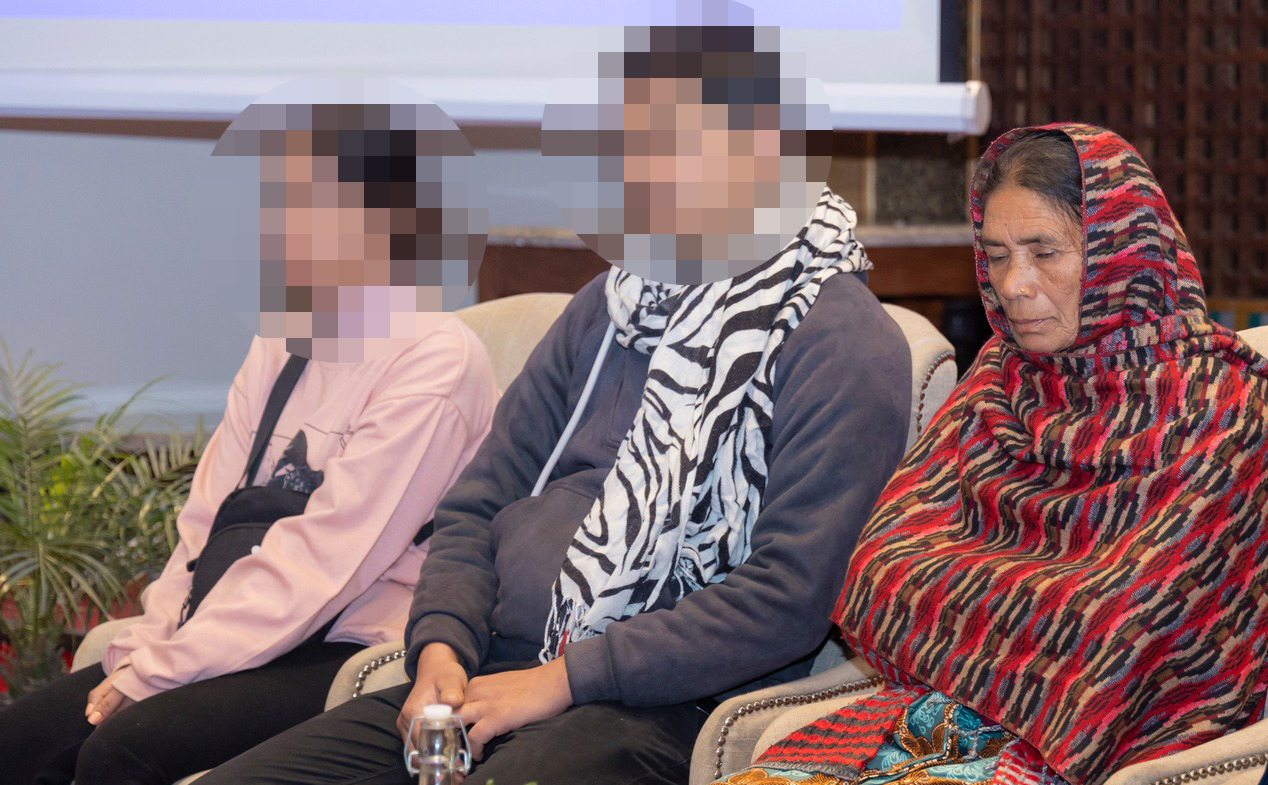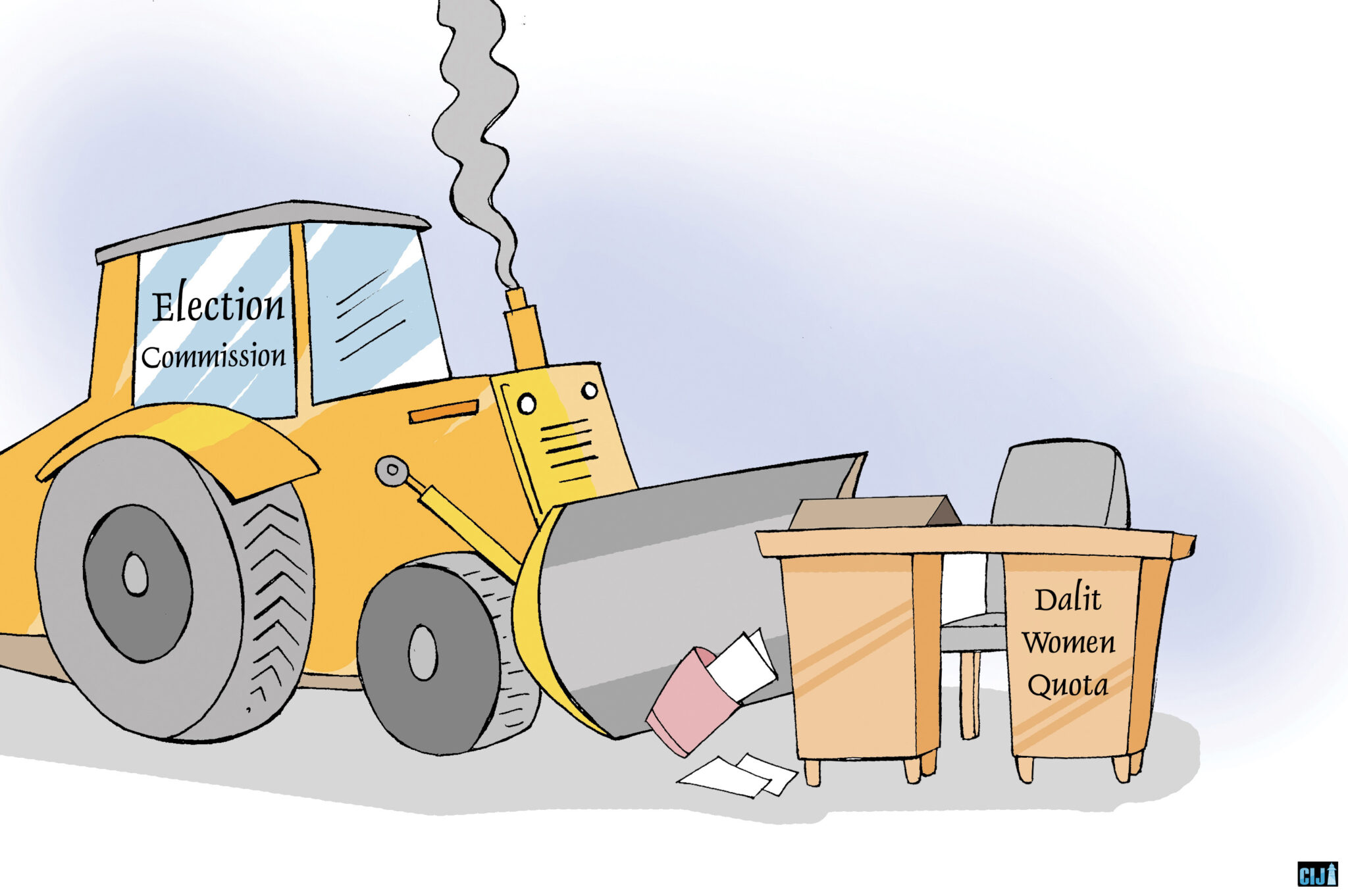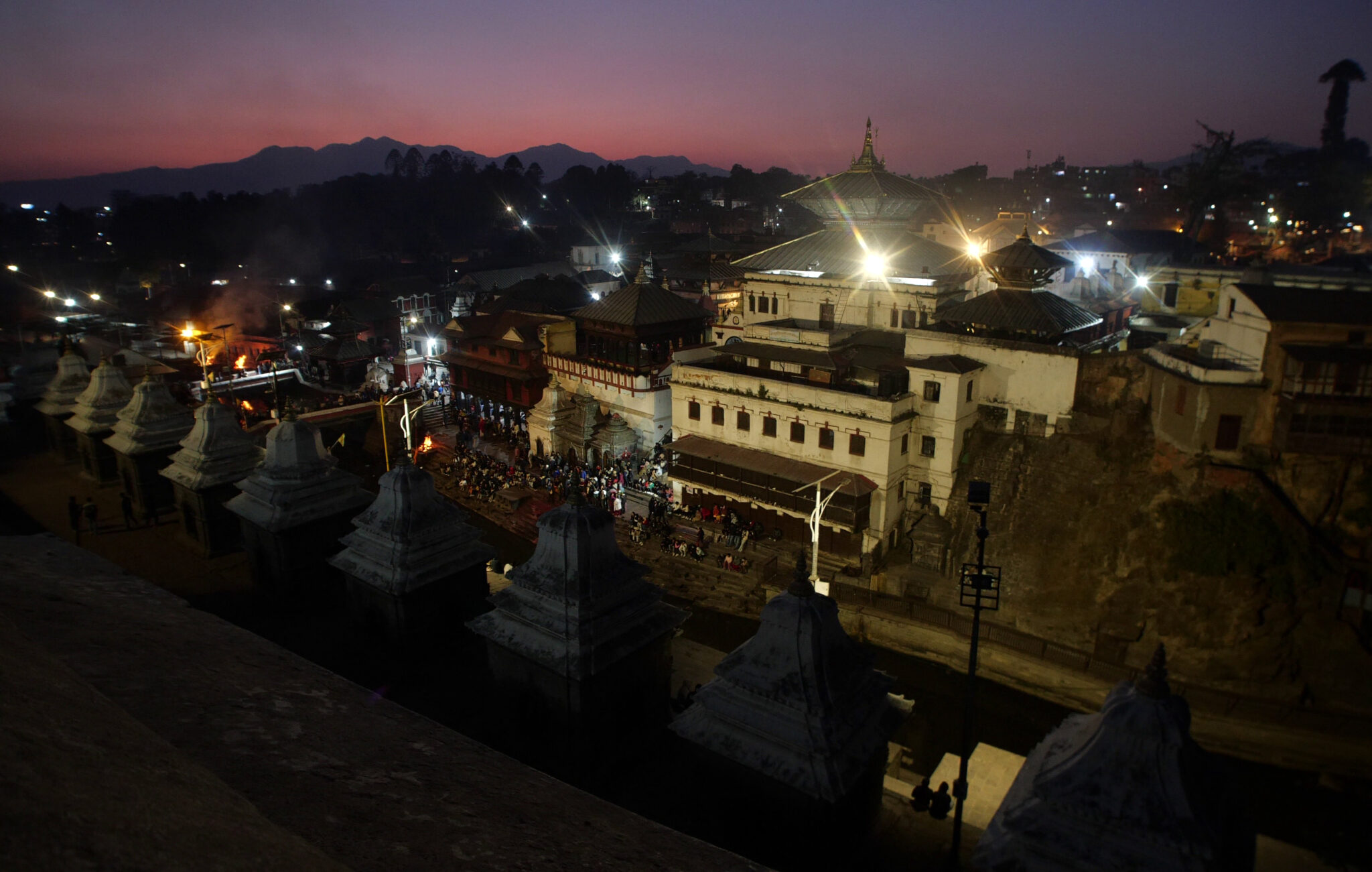Many Nepali women and their children are enduring the plight of statelessness due to discriminatory politics and government officials. Misogynistic laws, procedural gaps, and the apathy of relevant authorities contribute to the suppression of their civil right to live a dignified life.
Ajabi Poudel, |CIJ Nepal
At 13, Sanumaiya Chhetri arrived in Kathmandu seeking work and a better life, leaving Khopasi in Kavre. Yet, sorrows repeatedly marred her journey.
Born around 1959, six months later, Sanumaiya Chhetri lost her father Maila Karki; a year and a half later,, her mother Suntali also passed away. Villagers provided shelter until she made her way to Kathmandu.
Married to Krishna Chhetri, whom she met as a wage labourer in Kathmandu, Sanumaiya has three children. Krishna, a heavy drinker, vanished abruptly 40 years ago. Now 74, all Sanumaiya knows of her husband is his name. While Krishna was around, her focus was on raising children. The issue of citizenship never crossed her mind..But now, as her children have grown up, it’s the only thing that troubles her night and day as the entire family can’t get citizenship.
Three years ago, Sanumaiya petitioned the Supreme Court after the District Administration Office, Kathmandu claimed that the family can’t be granted citizenship as her husband’s identity couldn’t be ascertained. On January 8, 2023, Justices Til Prasad Shrestha and Anil Kumar Sinha ordered the District Administration Office, Kathmandu, to issue citizenship certificates by descent to the septuagenarian and her children in accordance with the law.
Despite the Supreme Court’s order, the administration withheld her citizenship, as she couldn’t provide proof of either her parents’ citizenship or that of her husband.
Chief District Officer Jitendra Basnet, highlights that despite the passage of the Citizenship Act, issues persist due to the absence of rules and procedures. Basnet explains, “The basis and procedure for granting citizenship haven’t been decided yet. Hence, the court’s order remains unimplemented.” Although he acknowledges Sanumaiya as a Nepali citizen, he emphasizes the lack of a legal foundation for granting citizenship.
Sanumaiya, grappling with daily challenges, hasn’t managed to revisit court for the order’s enforcement. She says, “My son and daughter-in-law left me. The youngest son, who was looking for his father, has been missing for three years. Because I don’t have citizenship, we have failed to register the birth of my grandson (my eldest son’s newborn). I don’t know where they are as they left me in disappointment.”
Madhav Prasad Dhungana, head of citizenship department, asserts that citizenship certificates can’t be granted solely based on emotions. He notes, “In Sanumaiya’s case, the court ordered the CDO himself to look into the issue and grant citizenship. However, there’s a lack of documents to support this decision.” Dhakal adds, “They don’t have any documents. She doesn’t have any neighbours or relatives to vouch for her, the only testimony is from the ward office, stating she’s been living in Kathmandu-4, Chandol for 40 years.”

Neha Thapa, Abinash Shrestha and Sanumaiya Chhetri
Hopeful that her missing husband will return, Sanumaiyan remains confined to her rented room. Without citizenship, she’s denied old age allowance and received no relief during the COVID epidemic, leading to the family’s separation
Dhakal questioned, “Every day, the public presents such judgments, but how can we grant them citizenship without proper documents?”
Reluctant district administration offices
In the case of Neha and Nistha Thapa from Kathmandu, who regularly visit the district administration office with their mother’s citizenship, the Supreme Court has instructed the DAO to provide citizenship. Despite knowing their father’s name, the sisters don’t know his whereabouts, relatives, or neighbours. Neha shared that when they presented the court’s decision at the district administration office, the employees insisted they presented their father.
As their father’s name is mentioned in school certificates and other documents, the district administration office maintained that they can’t be granted citizenship pretending that the father’s identification couldn’t be ascertained.
“Lack of citizenship shuts doors to livelihoods. We can’t even open a bank account, let alone take up employment or get a PAN card” Neha lamented, adding, ” Our mother is ill.” As she doesn’t have citizenship, Nistha’s aspiration to pursue higher education abroad has also been hampered. Expressing frustration, Neha questions, “How can it be our crime to know the name of the father who disappeared after giving birth to us? How is our capable mother, who raised and educated us, deemed incapable of granting us citizenship?”
Advocate Binu Lama, who is overseeing their case, says, “Even though the father’s name is written in some documents, they neither know about the father, nor do they have the father’s citizenship document.” However, on the same basis, DAO denied them citizenship by descent.
Sajan and Simran Manandhar from Lalitpur, despite having their father’s name on birth registration and school certificates, face hurdles in obtaining citizenship. Although their mother has citizenship by descent, and the Patan High Court ordered the DAO to grant citizenship, their application was rebuffed, “It is not possible to issue citizenship based on such verdicts. Whoever passed the verdict, go get it from there.”
Patriarchy rot
Despite the promulgation of the Nepal Citizenship (First Amendment) Bill, published in the gazette on May 31, 2023, resolving numerous past citizenship issues, it remains inadequate in addressing the challenges faced by thousands of mothers, including Sanumaiya.
Advocate Binu Lama remarks, “While this Act has provided relief for those denied citizenship by birth, it falls short in alleviating the struggles of mothers like Sanumaiya and her children. Despite the positive role of the court, discrimination persists within the administration.
- Binu Lama, Advocate
While this Act has provided relief for those denied citizenship by birth, it falls short in alleviating the struggles of mothers like Sanumaiya and her children. Despite the positive role of the court, discrimination persists within the administration.”
Advocate Meera Dhungana highlights that despite court rulings favoring the plaintiffs in numerous cases, the Chief District Officer has been reluctant to grant citizenship. According to her, the court orders face implementation challenges due to the resistance of the chief district officer and other employees who fail to acknowledge the existence and role of women. Dhungana asserts, “Patriarchal thinking fails to recognize women as parents. Why can’t a mother who can give birth and raise a child give the child an identity?”
Advocate Binu Lama clarifies that there is no law prohibiting citizenship acquisition in the mother’s name when the father is unidentified. She states, “There is no law preventing children of mothers with citizenship by descent from obtaining citizenship.” However, she emphasizes that a well-defined procedure can streamline this process.
According to her, the inclusion of certain points in the existing Citizenship Act, along with a clarified procedure, could resolve issues like Sanumaiya’s. However, there is a lack of consensus among political parties to amend the law.
Sub-section 5 of Section 2 of the Act stipulates, “A person born in Nepal to a Nepali citizen mother and living in Nepal, and whose father has not been identified, will acquire Nepalese citizenship on the basis of descent.” However, Chief District Officers have no clarity on the terms ‘not identified’
Advocate Meera Dhungana points out, “Numerous children who only have knowledge of their father’s name struggle to obtain citizenship. Even with a mother possessing citizenship by descent, children whose father’s name is documented in other papers are compelled to remain ‘non-citizens’.”
If the name alone is considered an identity, it suggests citizenship should be granted in such cases. However, if the name isn’t deemed an identity, neither the constitution nor the law permits granting citizenship solely on the basis of unacknowledged paternity.
Landmark verdict
The Supreme Court recently made a significant decision addressing the matter of unacknowledged paternity. On August 17, the Court ruled on a writ filed by Christina Maharjan from Lalitpur Mahalakshmi Municipality-6, elucidating the issue of unidentified fathers.
Christina filed a petition in the Supreme Court, requesting birth registration and citizenship recommendations exclusively under her mother’s name. Despite having a copy of her father’s citizenship, Christina refused to accept citizenship under his name, citing his abandonment of paternal responsibilities. Consequently, she applied for citizenship using her mother’s maiden surname.
How can it be our crime to know the name of the father who disappeared after giving birth to us? How is our capable mother, who raised and educated us, deemed incapable of granting us citizenship?
- Neha Thapa
In this instance, on August 17, the bench comprising Justices Anil Kumar Sinha and Nahkul Subedi emphasized that a child’s father’s identity is connected to factors such as his physical presence, the affection and care provided, and the responsibilities undertaken for the children by the person regarded as the biological father.
The judgment further stated that if there is no physical and emotional connection between the child and the alleged father in their life, the father should be deemed non-identified. The Supreme Court emphasized that even if the child lacks a physical or emotional relationship with the person identified by the mother as the biological father, they are not obligated to accept him as the father. The Court asserted that such acceptance should not be forced. The verdict also provided clarification on how to determine whether the father has been identified or not.
The verdict states that officials issuing citizenship should determine whether the father is ‘identified’ or ‘not identified’ based on the applicants’ self declaration. It also states that if the biological father or his family members don’t accept them as their children, officials issuing citizenship should deem the applicants as being children of ‘not identified’ fathers.
In such cases, where an individual seeks citizenship solely under the name of their mother, citing the non-identification of the father, it is the responsibility of the relevant office to facilitate the grant of citizenship, the verdict states.
Even with this judgment, the challenges faced by Sanumaiya and her children, as well as the request for citizenship by including the father’s name, like in the case of Sajan and Simran, remain unaddressed.
Advocate Sushma Gautam, with extensive experience in citizenship matters, accuses the district administration office of committing a crime by disregarding court decisions. She asserts, “Even the Citizenship Act has failed to resolve the issues faced by individuals like Sanumaiyan or Neha. This Act is discriminatory and incomplete.”
As per Clause 2 of Article 11 in Part 2 of the Constitution of Nepal, if an individual’s father or mother is a citizen of Nepal at the time of their birth, that person should be recognized as a citizen of Nepal. However, the absence of laws, regulations, and procedures to enforce this constitutional provision has compelled many Nepali citizens to be categorized as non-citizens.
Rabindra Prasad Acharya, spokesperson for the Ministry of Home Affairs, asserts that adherence to the written law is imperative. He states, “We must strictly adhere to the Constitution through legislation. If the law is perceived as discriminatory, it is the responsibility of the lawmakers. We cannot surpass the boundaries set by the law.”
Advocate Gautam highlights that in the constitution and the new law, there is no provision for children to acquire citizenship if the father’s name is known but the address is unknown. However, if both the father’s name and address are unknown, the child can obtain citizenship through the mother’s name.
“Thousands of people across the country have documents with their father’s name on them, but their address is unknown and they have to remain without citizenship”, says Advocate Gautam.
Gautam’s experience reveals that many individuals bring such issues to the Forum for Women, Law and Development (FWLD) where she works. She notes, “In some instances, children who are aware of their father’s name have been compelled to obtain citizenship as unidentified. This is entirely incorrect!”
Insulting provisions
In sub-section 3 of section 21 of the Citizenship Act, a provision has been introduced requiring any woman to self-declare the status of her husband as missing, unidentified, or absent. If this self-declaration is determined to be false, the individual making the false statement may face penalties, including imprisonment for six months to a year or a fine ranging from Rs 50,000 to Rs 100,000, or both.
Sabin Shrestha, director and advocate at the Women’s Law and Development Forum, argues that the provision requiring self-declaration about a missing husband constitutes discrimination against women. He contends, “The state has adopted differentiated treatment towards women by incorporating such a provision into the law. Nurturing children without a husband is inherently challenging. Therefore, seeking the husband’s identity while determining the citizenship of children raised amid hardship is inappropriate.” Shrestha emphasizes, “If the mother holds citizenship, her children should receive citizenship unconditionally. The law reinforces the outdated notion that only men carry forward the lineage.”
We must strictly adhere to the Constitution through legislation. If the law is perceived as discriminatory, it is the responsibility of the lawmakers. We cannot surpass the boundaries set by the law.
- Rabindra Prasad Acharya, Spokesperson, Ministry of Home Affairs
Advocate Meera Dhungana asserts that requiring any woman to self-declare that she lacks a husband is an insult to women.
Former judge Balaram KC questions, “Why is the system of self-declaration and punishment only applicable to women? Is there a provision for a man to declare himself regarding his wife?” He emphasizes that the law should not discriminate between men and women.
Deputy Attorney General Sanjeev Regmi from the Attorney General’s Office argues that a father’s identity encompasses not only his name but also his address. He questions, “How can someone be identified solely based on a name without any other supporting documents?”
Bhadrakali Pokharel, spokesperson for the Supreme Court, underscores the court’s flexibility in granting citizenship to the children of Nepali citizens. He clarifies that disputes of this nature can be resolved by adhering to the precedents established by the Supreme Court, noting the occurrence of numerous decisions in this category Pokharel states, “Even though thousands of cases related to citizenship of various natures are registered across the country, we do not have separate data for cases like Sanumaiyan’s.” Nevertheless, it is believed that many citizens are grappling with this problem.each year.
Hari Prasad Sharma, Assistant Chief District Officer of the District Administration Office, Kathmandu, reveals that numerous individuals with such issues visit the administration office daily, hopeful of obtaining citizenship. He states, “It is challenging to provide an exact number, but this problem is widespread, and it needs to be addressed through legal means.”
Hollow nationalism
Shashi Shrestha, chairman of the State Affairs Committee in the former House of Representatives, contends that the constitution itself carries discriminatory elements. She attributes the creation of discriminatory constitutions and laws to the mindset of many representatives who do not view women as complete human beings. Shrestha asserts that she advocated for equality, considering provisions in the constitution exclusively for women as discriminatory. She states, “When we proposed equal arrangements, there was disagreement. It wasn’t possible due to concerns about ‘hollow nationalism’.”
Former Supreme Court justice Balaram KC asserts that this issue emerges when lawmakers neglect their responsibilities. He states, “Mothers who are aware of their husband’s name are also compelled to lie, claiming ignorance, fearing that their children will be denied citizenship.” KC adds, “The government’s hollow nationalism has led to such flaws in the law.”
Balaram KC emphasizes that despite the constitution guaranteeing the right to a dignified life, women are often neglected in Nepali society. He contends, “The practice of seeking the father’s identity while the mother is present is incorrect.”
Constitutionalist Bipin Adhikari advocates for the establishment of a procedure within the current legal framework to address the existing challenges in obtaining citizenship. Adhikari points out, “Our law has its roots in Hinduism, and this continuity is reflected in the present legal system. It is inherently discriminatory.”
Sabin Shrestha, director at the Forum for Women, Law and Development reveals that his organization deals with 30 to 40 cases annually where the father’s name is mentioned in birth certificates and school documents, but obtaining citizenship is hindered by an unknown address. He emphasizes, “Children of Nepali mothers should be granted citizenship certificates unconditionally.”



